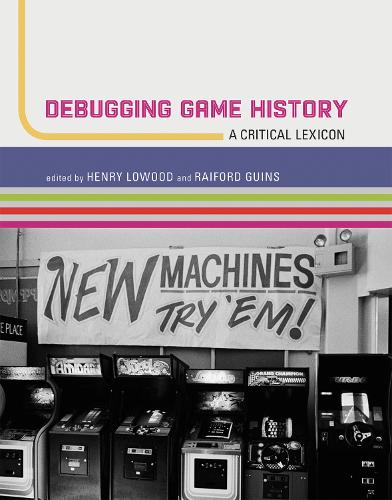
Debugging Game History: A Critical Lexicon
(Paperback)
Available Formats
Publishing Details
Debugging Game History: A Critical Lexicon
By (Author) Henry Lowood
Edited by Raiford Guins
MIT Press Ltd
MIT Press
6th February 2024
United States
Classifications
Professional and Scholarly
Non Fiction
History of Computing, digital and information technologies
794.8
Physical Properties
Paperback
464
Width 178mm, Height 229mm
369g
Description
Even as the field of game studies has flourished, critical historical studies of games have lagged behind other areas of research. Histories have generally been fact-by-fact chronicles; fundamental terms of game design and development, technology, and play have rarely been examined in the context of their historical, etymological, and conceptual underpinnings. This volume attempts to "debug" the flawed historiography of video games. It offers original essays on key concepts in game studies, arranged as in a lexicon-from "Amusement Arcade" to "Embodiment" and "Game Art" to "Simulation" and "World Building." Written by scholars and practitioners from a variety of disciplines, including game development, curatorship, media archaeology, cultural studies, and technology studies, the essays offer a series of distinctive critical "takes" on historical topics. The majority of essays look at game history from the outside in; some take deep dives into the histories of play and simulation to provide context for the development of electronic and digital games; others take on such technological components of games as code and audio. Not all essays are history or historical etymology-there is an analysis of game design, and a discussion of intellectual property-but they nonetheless raise questions for historians to consider. Taken together, the essays offer a foundation for the emerging study of game history. Contributors Marcelo Aranda, Brooke Belisle, Caetlin Benson-Allott, Stephanie Boluk, Jennifer deWinter, J. P. Dyson, Kate Edwards, Mary Flanagan, Jacob Gaboury, William Gibbons, Raiford Guins, Erkki Huhtamo, Don Ihde, Jon Ippolito, Katherine Isbister, Mikael Jakobsson, Steven E. Jones, Jesper Juul, Eric Kaltman, Matthew G. Kirschenbaum, Carly A. Kocurek, Peter Krapp, Patrick LeMieux, Henry Lowood, Esther MacCallum-Stewart, Ken S. McAllister, Nick Monfort, David Myers, James Newman, Jenna Ng, Michael Nitsche, Laine Nooney, Hector Postigo, Jas Purewal, Renee H. Reynolds, Judd Ethan Ruggill, Marie-Laure Ryan, Katie Salen Tekinba, Anastasia Salter, Mark Sample, Bobby Schweizer, John Sharp, Miguel Sicart, Rebecca Elisabeth Skinner, Melanie Swalwell, David Thomas, Samuel Tobin, Emma Witkowski, Mark J.P. Wolf Essays discuss the terminology, etymology, and history of key terms, offering a foundation for critical historical studies of games. Even as the field of game studies has flourished, critical historical studies of games have lagged behind other areas of research. Histories have generally been fact-by-fact chronicles; fundamental terms of game design and development, technology, and play have rarely been examined in the context of their historical, etymological, and conceptual underpinnings. This volume attempts to "debug" the flawed historiography of video games. It offers original essays on key concepts in game studies, arranged as in a lexicon-from "Amusement Arcade" to "Embodiment" and "Game Art" to "Simulation" and "World Building." Written by scholars and practitioners from a variety of disciplines, including game development, curatorship, media archaeology, cultural studies, and technology studies, the essays offer a series of distinctive critical "takes" on historical topics. The majority of essays look at game history from the outside in; some take deep dives into the histories of play and simulation to provide context for the development of electronic and digital games; others take on such technological components of games as code and audio. Not all essays are history or historical etymology-there is an analysis of game design, and a discussion of intellectual property-but they nonetheless raise questions for historians to consider. Taken together, the essays offer a foundation for the emerging study of game history. Contributors Marcelo Aranda, Brooke Belisle, Caetlin Benson-Allott, Stephanie Boluk, Jennifer deWinter, J. P. Dyson, Kate Edwards, Mary Flanagan, Jacob Gaboury, William Gibbons, Raiford Guins, Erkki Huhtamo, Don Ihde, Jon Ippolito, Katherine Isbister, Mikael Jakobsson, Steven E. Jones, Jesper Juul, Eric Kaltman, Matthew G. Kirschenbaum, Carly A. Kocurek, Peter Krapp, Patrick LeMieux, Henry Lowood, Esther MacCallum-Stewart, Ken S. McAllister, Nick Monfort, David Myers, James Newman, Jenna Ng, Michael Nitsche, Laine Nooney, Hector Postigo, Jas Purewal, Renee H. Reynolds, Judd Ethan Ruggill, Marie-Laure Ryan, Katie Salen Tekinba, Anastasia Salter, Mark Sample, Bobby Schweizer, John Sharp, Miguel Sicart, Rebecca Elisabeth Skinner, Melanie Swalwell, David Thomas, Samuel Tobin, Emma Witkowski, Mark J.P. Wolf
Author Bio
Henry Lowood is Curator for History of Science and Technology and for Film and Media collections at Stanford University and the coeditor of The Machinima Reader (MIT Press). Raiford Guins is Professor of Culture and Technology at Stony Brook University and the author of Game After- A Cultural Study of Video Game Afterlife (MIT Press).
